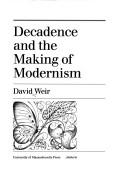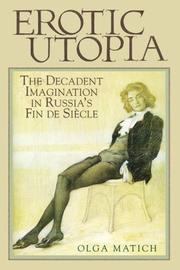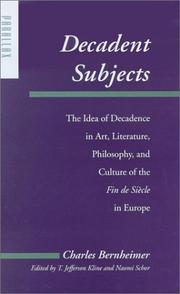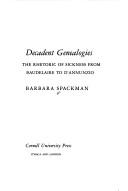| Listing 1 - 10 of 34 | << page >> |
Sort by
|
Book
ISBN: 0674919696 0674919718 Year: 2018 Publisher: Cambridge, MA : Harvard University Press,
Abstract | Keywords | Export | Availability | Bookmark
 Loading...
Loading...Choose an application
- Reference Manager
- EndNote
- RefWorks (Direct export to RefWorks)
In 1857, Charles Baudelaire described the colonial condition as one in which "a nation begins with decadence and starts off where the others leave off." A century later, Frantz Fanon would argue that postcolonial artists were "beginning at the end," following the West's "path of negation and decadence" while skipping the inventive phase of youth. In Beginning at the End, Robert Stilling argues that for writers and artists such as Chinua Achebe, Agha Shahid Ali, Derek Walcott, Wole Soyinka, Yinka Shonibare, Bernardine Evaristo, and Derek Mahon, the notion of being caught between the decadence of Europe and the unformed possibilities of postcolonial cultures marks the founding condition for a postcolonial poetics. For these figures, the idea of decadence would haunt their attempts to carve out a place for the arts in postcolonial society, forcing them to negotiate between their own sense of the demands of art and the pressure to conform to a revolutionary politics. In reimagining the role of poetry and the visual arts in the formation of national cultures, these artists turned toward the oppositional politics and anti-realist aesthetics of writers such as Oscar Wilde to affirm a commitment to artifice and the imagination while fending off the charge of decadence associated with modernism and the idea of art for art's sake. Taking a transnational approach, Beginning at the End expands the study of literary decadence beyond fin-de-siècle Europe, and demonstrates the continuing importance to postcolonial thought of figures such as Oscar Wilde, Henry James, J.-K. Huysmans, Walter Pater, and Max Beerbohm.--

ISBN: 0585084262 9780585084268 0870239910 0870239929 9780870239915 9780870239922 Year: 1995 Publisher: Amherst : University of Massachusetts Press,
Abstract | Keywords | Export | Availability | Bookmark
 Loading...
Loading...Choose an application
- Reference Manager
- EndNote
- RefWorks (Direct export to RefWorks)
The cultural phenomenon known as "decadence" has often been viewed as an ephemeral artistic vogue that fluorished briefly in late nineteenth- and early twentieth-century Europe. This study makes the case for decadence as a literary movement in its own right, based on a set of aesthetic principles that formed a transitional link between romanticism and modernism. Understood in this developmental context, decadence represents the aesthetic substratum of a wide range of fin-de-siecle literary schools, including naturalism, realism, Parnassianism, aestheticism, and symbolism. As an impulse toward modernism, it prefigures the thematic, structural, and stylistic concerns of later literature. David Weir demonstrates his thesis by analyzing a number of French, English, Italian, and American novels, each associated with some specific decadent literary tendency. The book concludes by arguing that the decadent sensibility persists in popular culture and contemporary theory, with multiculturalism and postmodernism representing its most current manifestations.
Decadence (Literary movement) --- Modernism (Literature) --- Languages & Literatures --- Literature - General --- Crepuscolarismo --- Literary movements --- Literature, Modern --- History and criticism
Book
ISBN: 0199861137 0199861129 1299939821 019933272X 9780199861132 9780199332724 9780199861125 Year: 2013 Publisher: New York ; Oxford : Oxford University Press,
Abstract | Keywords | Export | Availability | Bookmark
 Loading...
Loading...Choose an application
- Reference Manager
- EndNote
- RefWorks (Direct export to RefWorks)
'Fictions of Autonomy' presents a revisionary account of aesthetic autonomy and transnational modernism with a range of readings that includes works by Wilde, Eliot, Joyce, Barnes, and Stevens alongside writings by theorists like Adorno and de Man.
Aestheticism (Literature) --- Autonomy (Philosophy) --- Literature, Modern --- Modernism (Literature) --- Crepuscolarismo --- Literary movements --- Postmodernism (Literature) --- Decadence (Literary movement) --- Philosophy --- History and criticism --- Theory, etc.

ISBN: 9786612269776 0299208834 1282269771 9780299208837 0299208842 9780299208844 029920880X 9780299208806 9780299208844 Year: 2005 Publisher: Madison, Wis. : University of Wisconsin Press,
Abstract | Keywords | Export | Availability | Bookmark
 Loading...
Loading...Choose an application
- Reference Manager
- EndNote
- RefWorks (Direct export to RefWorks)
Russian literature --- Sex in literature. --- Authors, Russian --- Decadence (Literary movement) --- Russian authors --- Literary movements --- Literature, Modern --- History and criticism. --- Attitudes. --- History and criticism

ISBN: 0773562095 9780773562097 0773507108 9780773507104 Year: 1989 Publisher: Kingston : McGill-Queen's University Press,
Abstract | Keywords | Export | Availability | Bookmark
 Loading...
Loading...Choose an application
- Reference Manager
- EndNote
- RefWorks (Direct export to RefWorks)
Trehearne observes that in most cases the Aesthetic influence was sustained through the entire career of the poets whose work he examines. Although later affected by the Modernists, their works continued to be shaped and distinguished by an early Aesthetic training. In the case of A.J.M. Smith, for example, his initial thematic and stylistic Aetheticism affects his mature critical pronouncements. John Glassco, who was influenced by the Aesthetic and Modernist ideas throughout his career, created a unique form of Aesthetic modern poetry. Trehearne's new readings of major and minor Canadian poets make Aestheticism and the Canadian Modernists a central text in the assessment of Canadian literary history from a contemporary point of view.
Canadian poetry --- Aestheticism (Literature) --- Decadence (Literary movement) --- Literary movements --- Literature, Modern --- History and criticism. --- History and criticism --- Esthétisme (Littérature) --- Poésie canadienne --- Histoire et critique

ISBN: 0801874645 9780801874642 9780801867408 0801867401 Year: 2002 Publisher: Baltimore, Md. : Johns Hopkins University Press,
Abstract | Keywords | Export | Availability | Bookmark
 Loading...
Loading...Choose an application
- Reference Manager
- EndNote
- RefWorks (Direct export to RefWorks)
Charles Bernheimer described decadence as a "stimulant that bends thought out of shape, deforming traditional conceptual molds." In this posthumously published work, Bernheimer succeeds in making a critical concept out of this perennially fashionable, rarely understood term. Decadent Subjects is a coherent and moving picture of fin de sïcle decadence. Mature, ironic, iconoclastic, and thoughtful, this remarkable collection of essays shows the contradictions of the phenomenon, which is both a condition and a state of mind. In seeking to show why people have failed to give a satisfactory account of the term decadence, Bernheimer argues that we often mistakenly take decadence to represent something concrete, that we see as some sort of agent. His salutary response is to return to those authors and artists whose work constitutes the topos of decadence, rereading key late nineteenth-century authors such as Nietzsche, Zola, Hardy, Wilde, Moreau, and Freud to rediscover the very dynamics of the decadent. Through careful analysis of the literature, art, and music of the fin de sïcle including a riveting discussion of the many faces of Salome, Bernheimer leaves us with a fascinating and multidimensional look at decadence, all the more important as we emerge from our own fin de sïcle.
Decadence in art. --- Decadence (Literary movement) --- Degeneration --- Aesthetics, European --- Literary movements --- Literature, Modern --- Decadence --- Eugenics --- Heredity, Human --- Sociology --- Vice --- History --- History and criticism
Book
ISBN: 0748692150 9780748692163 0748692169 9780748692156 9780748692132 Year: 2014 Publisher: Edinburgh
Abstract | Keywords | Export | Availability | Bookmark
 Loading...
Loading...Choose an application
- Reference Manager
- EndNote
- RefWorks (Direct export to RefWorks)
The first anthology of Decadent short stories reflecting a variety of fin de siècle themesGBS_insertPreviewButtonPopup(['ISBN:9780748692149','ISBN:9780748692132','ISBN:9780748692156','ISBN:9780748692163']);This wide-ranging anthology showcases for the first time the short story as the most attractive genre for British writers who experimented with Decadent themes and styles. From familiar writers such as Ernest Dowson, Arthur Symons and Oscar Wilde to less well known writers such as Charles Ricketts, Victoria Cross and Ella D’Arcy, the 36 stories demonstrate ideas of class, gender, sexuality, and science as well as the Gothic, social satire, Symbolist fantasy, fairy tale, Naturalism/Realism, Impressionism, erotica, and the scientific romance. The selections represent the important role that magazine culture played in the unprecedented explosion of the Decadent short story in the 1890s. A full introductory essay sets the scene, while an introduction and endnotes for each story and explanatory material at the end of the book – including a chronologically arranged and annotated list of Aesthetic and Decadent stories and a select bibliography – make this anthology stand out.Key Features Brings a variety of rare and important stories together in one volume reflecting an influential literary genreExpands the scope of Decadence by bringing together male and female voices, obscure and famous authors, and stylistic and thematic concerns such as New Woman fiction, the Gothic, Impressionism, Realism, paganism, class, homosexuality, and science Includes a detailed introduction, an introduction and endnotes for each story, 3 appendices containing parodies, background sources, a chronologically arranged and annotated list of Aesthetic and Decadent stories, and a select bibliography"
Short stories, English --- English fiction --- Decadence (Literary movement) --- English --- Languages & Literatures --- English Literature --- Literary movements --- Literature, Modern --- English literature --- English short stories --- History and criticism
Book
ISBN: 1421429438 9781421429434 9781421429427 142142942X Year: 2019 Publisher: Baltimore Johns Hopkins University Press
Abstract | Keywords | Export | Availability | Bookmark
 Loading...
Loading...Choose an application
- Reference Manager
- EndNote
- RefWorks (Direct export to RefWorks)
Decadence in the Age of Modernism begins where the history of the decadent movement all too often ends: in 1895. It argues that the decadent principles and aesthetics of Oscar Wilde, Walter Pater, Algernon Swinburne, and others continued to exert a compelling legacy on the next generation of writers, from high modernists and late decadents to writers of the Harlem Renaissance. Writers associated with this decadent counterculture were consciously celebrated but more often blushingly denied, even as they exerted a compelling influence on the early twentieth century.Offering a multifaceted critical revision of how modernism evolved out of, and coexisted with, the decadent movement, the essays in this collection reveal how decadent principles infused twentieth-century prose, poetry, drama, and newspapers. In particular, this book demonstrates the potent impact of decadence on the evolution of queer identity and self-fashioning in the early twentieth century. In close readings of an eclectic range of works by Virginia Woolf, James Joyce, and D. H. Lawrence to Ronald Firbank, Bruce Nugent, and Carl Van Vechten, these essays grapple with a range of related issues, including individualism, the end of Empire, the politics of camp, experimentalism, and the critique of modernity.
Modernism (Literature) --- Decadence (Literary movement) --- American literature --- English literature --- Literary movements --- Literature, Modern --- Crepuscolarismo --- History and criticism. --- History and criticism --- E-books
Book
ISBN: 1108335837 1108539793 1108337406 1108424139 Year: 2018 Publisher: Cambridge : Cambridge University Press,
Abstract | Keywords | Export | Availability | Bookmark
 Loading...
Loading...Choose an application
- Reference Manager
- EndNote
- RefWorks (Direct export to RefWorks)
Charting the failure of the Romantic critique of political economy, Richard Adelman explores the changing significances and the developing concepts of idleness and aesthetic consciousness during the nineteenth century. Through careful analysis of some of the period's most influential thinkers, including John Stuart Mill, George Eliot, John Ruskin and Karl Marx, Adelman weaves together evolving ideas across a range of intellectual discourses - political economy, meditative poetry, the ideology of the 'gospel of work', cultural theory, the Gothic and psychoanalysis. In doing so, he reconstructs debates over passivity and repose and demonstrates their centrality to the cultural politics of the age. Arguing that hardened conceptions of aesthetic consciousness come into being at moments of civic unrest concerning political representation and that the fin-de-siècle witnesses the demonization of the once revolutionary category of aesthetic consciousness, the book demonstrates that late eighteenth-century positivity around human spirituality is comprehensively dismantled by the beginning of the twentieth century.

ISBN: 0801422906 9781501723308 1501723308 9780801422904 1501723316 Year: 2018 Publisher: Cornell University Press
Abstract | Keywords | Export | Availability | Bookmark
 Loading...
Loading...Choose an application
- Reference Manager
- EndNote
- RefWorks (Direct export to RefWorks)
Barbara Spackman here examines the ways in which decadent writers adopted the language of physiological illness and alteration as a figure for psychic otherness. By means of an ideological and rhetorical analysis of scientific as well as literary texts, she shows how the rhetoric of sickness provided the male decadent writer with an alibi for the occupation and appropriation of the female body.
Comparative literature --- Thematology --- Decadence (Literary movement) --- Decadence in literature. --- Literature --- Literature, Modern --- Mental illness in literature. --- Psychology. --- History and criticism. --- Decadence (Literary movement). --- LITERARY CRITICISM / European / Italian. --- Insanity in literature --- Psychopathology in literature --- Literary movements --- History and criticism --- History of medicine
| Listing 1 - 10 of 34 | << page >> |
Sort by
|

 Search
Search Feedback
Feedback About
About Help
Help News
News